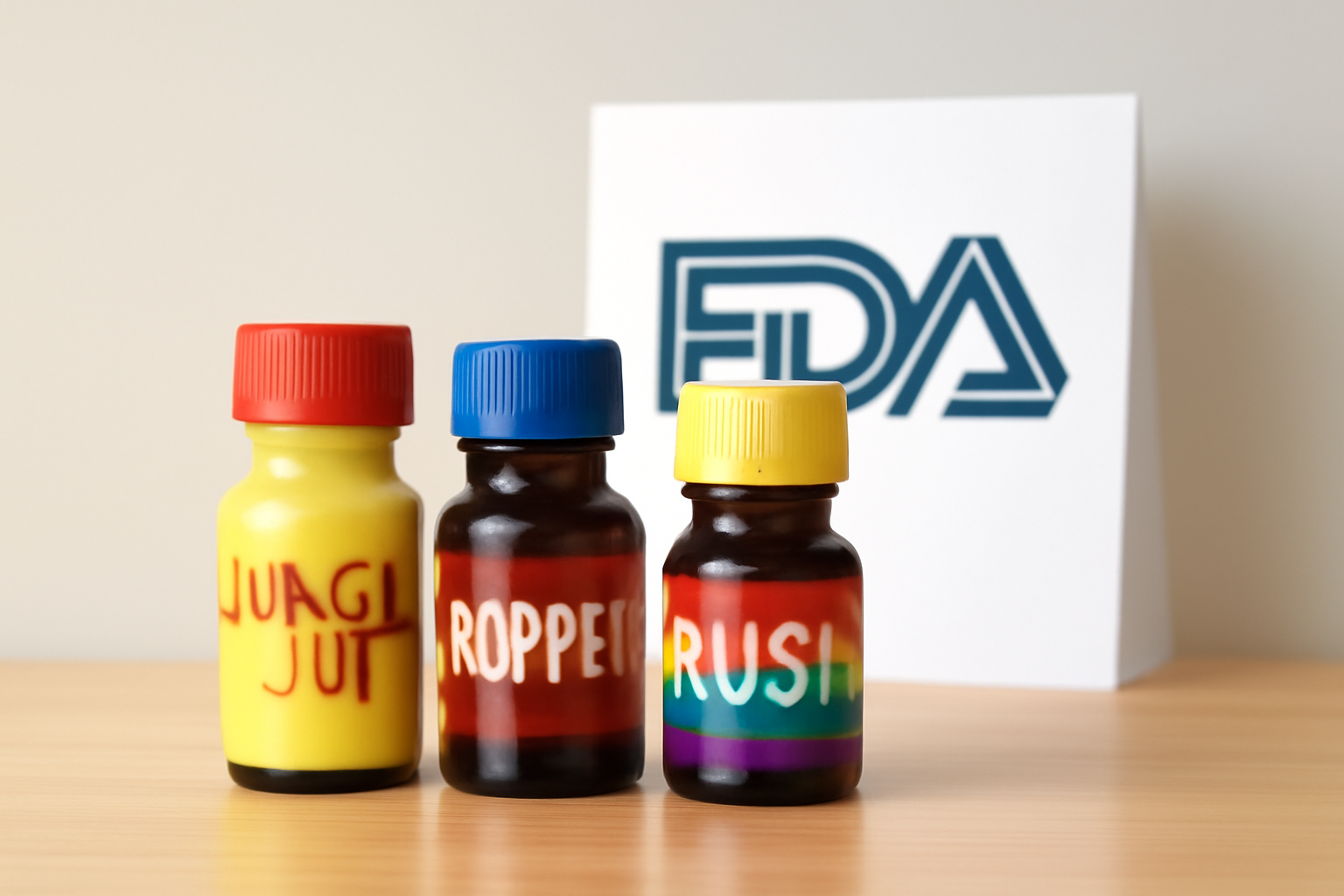
In a recent move, the Food and Drug Administration (FDA) has taken action against certain inhalant products, commonly known as "poppers," that are well-known and frequently used within the LGBTQ+ community. These products have traditionally been used as recreational aids and are said to enhance experiences such as dancing or sexual activities. However, the FDA has raised concerns about the safety and legality of these products, prompting a new wave of regulatory scrutiny.
Understanding "Poppers"
"Poppers" refer to a class of chemicals known as alkyl nitrites, which are often sold in small bottles and used as inhalants. They gained popularity in the 1970s and are often associated with the LGBTQ+ community as a means to relax muscles and enhance pleasure during certain activities. Despite their cultural prevalence, poppers are not without health risks. Short-term effects include a sudden drop in blood pressure, dizziness, and increased heart rate. Long-term use can lead to more severe health issues, including potential damage to the heart and other organs.
FDA's Rationale for Regulation
The FDA's recent actions are rooted in both health and legal concerns. The agency has deemed these products to be unapproved drugs, and as such, they are illegal to sell in the United States. The primary concern is the potential for serious health risks, especially when poppers are used frequently or in combination with other substances such as alcohol or erectile dysfunction medications. The FDA has issued warnings to several companies believed to be selling poppers illegally, emphasizing the need to remove them from the market to protect public health.
Impact on the LGBTQ+ Community
The crackdown on poppers has sparked significant discussion within the LGBTQ+ community. Some members view the FDA's actions as a necessary step to safeguard health, while others see it as an intrusion into personal freedoms and an oversight of the community's unique needs. Many within the community have expressed concerns that the crackdown could drive the sale of poppers underground, leading to unregulated and potentially more dangerous products reaching consumers.
Responses and Reactions
LGBTQ+ advocacy groups have been vocal about the need for the FDA to provide clearer guidance and education about the risks associated with poppers, rather than outright bans. They argue for a balanced approach that both protects public health and respects the autonomy of individuals to make informed choices about their bodies and health.
Furthermore, some health professionals have suggested exploring harm reduction strategies, which could include safer formulations and better consumer education. Such strategies have been deployed in other areas of public health, such as needle exchange programs for drug users, and could potentially offer a more constructive approach to managing the risks associated with poppers.
The Path Forward
The debate surrounding the FDA's crackdown on poppers highlights the ongoing tension between regulatory bodies and community autonomy. As the situation develops, it will be crucial for all stakeholders, including health professionals, advocacy groups, and regulatory agencies, to engage in open dialogue. The goal should be to find a solution that respects the unique cultural contexts of the LGBTQ+ community while ensuring that health risks are minimized.
In the meantime, individuals who choose to use poppers are advised to stay informed about the potential risks and to take precautions to minimize harm. This includes avoiding mixing poppers with other substances, understanding the legal status of these products, and seeking medical advice if they have concerns about health issues related to use.
The FDA's actions serve as a reminder of the delicate balance between regulation and individual choice, highlighting the need for ongoing conversations about health, safety, and personal freedom within marginalized communities.
Related Posts
Triumphant Trans Woman Wins Legal Battle and Inspires Others to Stand Up for Their Rights
Breaking new ground: a landmark victory in transgender rights After battling in courtrooms and enduring endless challenges, Diana Portillo, a transgender woman, has secured a monumental victory in her decade-long fight against workplace discrimination. The result? Nearly $1 million awarded in a historic settlement. But this isn't just a win on paper—it represents a powerful precedent in combati [...]
Pride Month in Latin America: Protests and Demands for Equality
**Celebrating Pride and advocating LGBTQ+ rights in Latin America** Pride Month in Latin America was a lively mix where celebration met activism. Communities united, not just throwing a party but making a stand—demanding equality and pushing governments toward better protection and rights recognition. Throughout Latin America, pride events erupted in marches and cultural displays, each with a c [...]
Transgender Erasure Actions Implemented by National Park Service
```html Trump administration's impact on national park service and transgender recognition The Trump administration made notable moves in undermining transgender representation, which included directing agencies like National Park Service not include "T" and "Q" when they refered “LGBTQ” in any official communication. This move seems part a broader plan by this administration aimed at reducin [...]